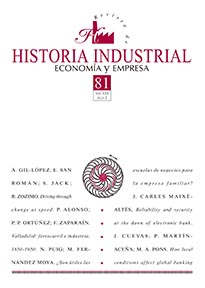How local conditions affect global banking: the case of BBVA and Santander
DOI:
https://doi.org/10.1344/rhi.v30i81.31071Paraules clau:
Banking globalisation, Financial markets in Latin America, Spanish banksResum
This paper explores why Spanish banks internationalize and why Latin America has been the main region for the international expansion of BBVA and Santander. It shows that prior to 1986 Spanish banks had a limited presence abroad, and analyses the main drivers of this initial expansion (remittances and trade connections). However, from 1986 on, there was a confluence of domestic and external factors (economic and regulatory changes in Latin America) that encouraged the international forays of BBVA and Santander. The fact that changes in the Spanish and Latin American financial sectors occurred just when other transnational banks were turning their attention to other regions created the optimal conditions for the expansion of Spanish banks in Latin America.
Descàrregues
Descàrregues
Publicades
Com citar
Número
Secció
Llicència
The author assigns all rights to the publisher. Creative Commons
The author who publishes in this journal agrees to the following terms:
- The author assigns all intellectual property rights exclusively to the publisher for the entire duration of the applicable intellectual property rights.
- The publisher will distribute the texts under the Creative Commons Attribution License, which allows others to share the work, provided that they acknowledge the authorship, its initial publication in this journal, and the conditions of the license.





